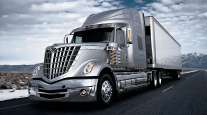Senior Reporter
Navistar, TuSimple Partner to Launch Self-Driving Trucks in 2024

[Stay on top of transportation news: Get TTNews in your inbox.]
Truck and engine maker Navistar International Corp., and TuSimple, a global self-driving technology company, announced July 15 a strategic partnership to co-develop SAE Level 4 self-driving trucks targeted for production by 2024. It was a step one expert described as a milestone in terms of original equipment manufacturer and startup interactions.
In addition, Navistar took an undisclosed minority stake in TuSimple.
“Autonomous technology is entering our industry and will have a profound impact on our customers’ businesses,” Navistar CEO Persio Lisboa said in a release. “Navistar’s strategic partnership with TuSimple positions us to be a leader in developing solutions for our customers by leveraging our organizations’ collective expertise to integrate our vehicle design and systems integration capabilities with TuSimple’s innovative autonomous technology.”

“We are kicking off a full go-to-market production program,” TuSimple President Cheng Lu said. “With the combined expertise of Navistar and TuSimple, we have a clear path to commercialize self-driving Class 8 trucks at scale.”
The move puts Navistar and its International brand of trucks into an arena that already includes Daimler Trucks, Paccar Inc., Plus.ai and Volvo Group.
TuSimple and Navistar began joint development of pre-production units in 2018. The endeavor is highly collaborative, noted Navistar Corporate Communications Manager Bre Whalen. “TuSimple will lead the software integration of the autonomous system and Navistar will provide full vehicle hardware system integration. But there’s more than just software and hardware at play,” she told Transport Topics. “We need to build in the behavior of the vehicle, its personality. How does it become a good community driver and deliver reliability, safety and quality? We’re starting from the beginning and assessing what a truck needs to do in an autonomous form. But this vehicle will look largely like vehicles today with modifications to integrate the autonomous technology and will include all traditional driver controls to drive manually, as necessary.”
She added that the trucks will be available to all interested customers in North America.
One expert said growth in the automated sector will depend on the trucks’ ability to match the performance needs of fleets.

Lu
“For automated trucking to scale up, startups must rely on OEMs to produce Class 8 tractors optimized for driverless operations, in terms of redundancy, power, cooling and more,” said Richard Bishop, principal of automated vehicles strategy and partnerships for Bishop Consulting. “Redundancy of safety-critical components such as brakes and steering is particularly important for a robust safety case. Startups and OEMs have been discussing this for the last couple of years, and the TuSimple Navistar partnership is the first to be announced publicly. This is a significant step forward for the industry.”
TuSimple’s aim is to transform the $800 billion U.S. trucking industry by enhancing safety, increasing efficiency and significantly reducing operating costs, according to the company headquartered in San Diego with facilities in Tucson, Ariz., Shanghai and Beijing.

International logo by Nam Y. Huh/Associated Press; TuSimple truck by Seth Clevenger/Transport Topics
TuSimple operates a fleet of 40 self-driving trucks in the U.S., shipping freight autonomously for companies such as UPS Inc. and McLane Co. between Arizona and Texas. TuSimple plans to demonstrate completely driverless operations in 2021.
SAE Level 4 trucks are those in which the vehicle can travel without driver input or backup assistance, at least within specific areas and conditions.
In March 2019, Daimler Trucks, a unit of Daimler AG, agreed to acquire a majority stake in autonomous vehicle pioneer Torc Robotics to develop Level 4 trucks for the U.S. market. It began testing trucks in September.

How can fleet managers harness technology to get a better handle on vehicle speed and improve their safety culture? Host Seth Clevenger speaks with Mathieu Boivin of E-Smart and Jonathan Hubbard of SpeedGauge. Hear a snippet, above, and get the full program by going to RoadSigns.TTNews.com.
In June 2019, Volvo Group announced it expanded its relationship with Nvidia Corp. to co-develop the decision-making system for Volvo autonomous commercial vehicles eventually intended for use on public roads and transportation facilities, among other applications.
Paccar displayed a Kenworth T680 autonomous truck in January at CES in Las Vegas. It said its Peterbilt Motors Co. and Kenworth Truck Co. brands are used among independent autonomous driving technology developers as they refine the process. “We look forward to deepening our productive partnerships with these innovative companies in the future,” a company release said.
In Sept. 2019, Plus.ai announced a joint venture with FAW Jiefang, China’s oldest and largest truck manufacturer, to develop autonomous trucks for China.
Want more news? Listen to today's daily briefing:
Subscribe: Apple Podcasts | Spotify | Amazon Alexa | Google Assistant | More




